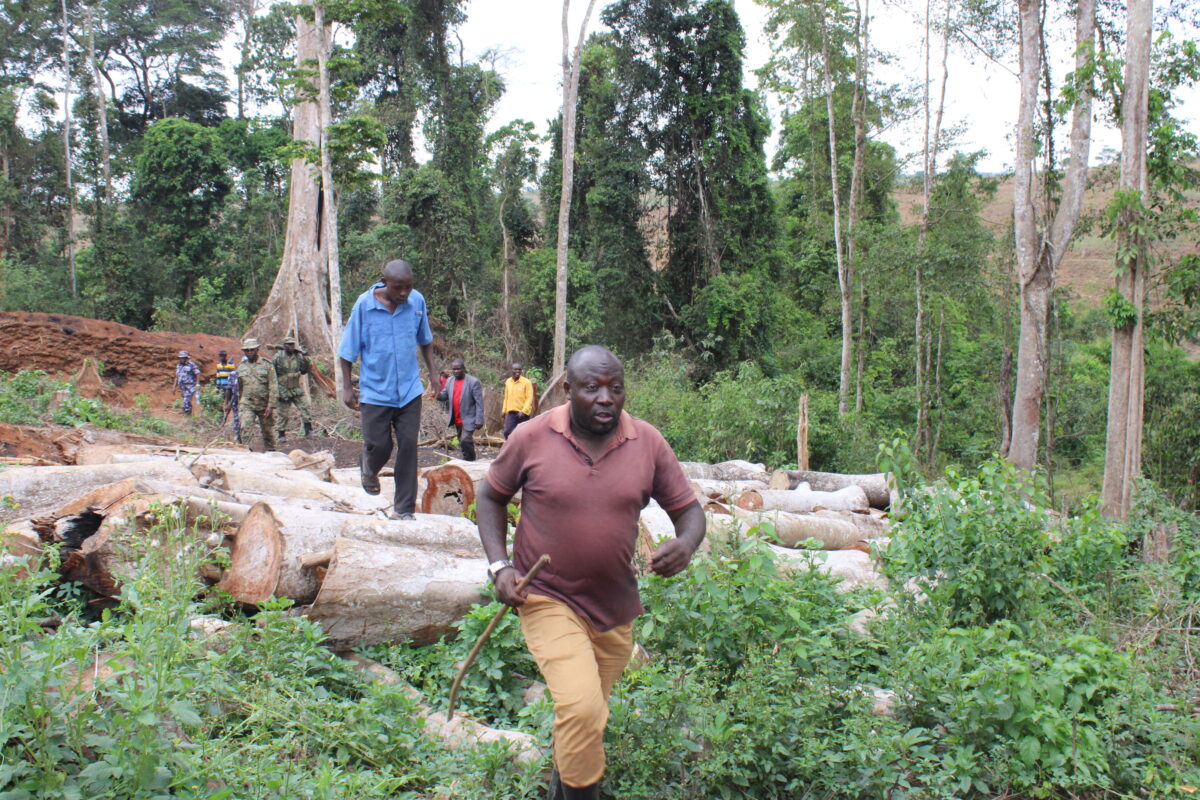Beneath the lush canopy of Bugoma, Uganda’s crown jewel of biodiversity, an environmental clash rages.
A leaked report, dated November 30, 2023, which The Albertine Journal has obtained, on the forest’s contested boundaries has ignited a firestorm of conflicting claims and accusations, leaving its fate hanging precariously in the balance.
The survey aimed to ascertain whether Hoima Sugar encroached upon Bugoma Forest, alongside resolving other pending boundary verification exercises mandated by the court, and ensuring the conservation of the forest.
This verdant haven, teeming with endangered primates, ancient trees, and vital water sources, is not just a sanctuary for wildlife; it is a crucial defense against climate change, absorbing greenhouse gases and regulating rainfall.
Yet, its emerald cloak faces relentless pressure from encroaching sugarcane fields, timber interests, and conflicting ownership claims. These threaten to upset the delicate balance of this unique ecosystem.
At the heart of the controversy lies the recent “boundary opening report,” commissioned by the Ugandan cabinet.
Critics cry foul, alleging the report legitimises powerful figures, including a prominent timber dealer and a sugar company accused of illegal deforestation.
These individuals, the report claims, are now deemed “lawful owners” of vast swathes within the forest’s supposed confines.
In August 2019, cabinet ordered the Land’s ministry department of Surveys and Mapping to re-open the boundary of the forest.
This was after Bunyoro-Kitara Kingdom gazetted a 22-square-mile piece of land in 2016, which was later leased to Hoima Sugar Limited at sh3.9b for sugarcane growing.
National Environmental Management Authority (NEMA) later reduced the acreage of sugarcane growing to nine square miles.
The report indicates that Hoima Sugar and the Omukama, Solomon Gafabusa Iguru, are recognised as the lawful owners of the land, much to the dismay of other individuals and companies who claim and occupy square miles of land, which have also been mapped.
Furthermore, the report reveals discrepancies between the boundary plans of the National Forestry Authority (NFA), which compute to a total area of 39,493 hectares, a figure contested by the NFA, which insists on maintaining the original 41,144 hectares.
Environmentalists and local communities fiercely challenge the move to give away forest land.
They denounce the lack of proper consultation, transparent surveys, and environmental impact assessments.
Dickens Kamugisha, the executive director for African Institute for Energy Governance (AFIEGO), lambasts the Government for “secretly doing surveys without independent stakeholders,” echoing concerns about a biased outcome favouring industry giants.
The conservation advocate faults NEMA for allowing the destruction of the forest by letting the growing of sugarcane on protected land. Kamugisha is spearheading the Save Bugoma Campaign.
Francis Atugonza, the former Hoima City Mayor, is claiming ancestral rights to a disputed region totalling 1,318 hectares. Atugonza vehemently refutes the report’s findings.
He accuses authorities of “unjust appropriation” and vows to fight for his land in court.
This sentiment is echoed by Ismail Kusemererwa, the executive director of Mid-Western Region Anti-Corruption Coalition (MIRAC), who fears the report is a “compromised” document that unfairly overlooks customary land claims.
Meanwhile, Hoima Sugar, the company implicated in deforestation, distances itself from the report’s conclusions, while Mustapha Zaidi, the timber dealer, denies encroaching on the forest reserve.
“The report was done by a team of surveyors from NFA, lands ministry and the Ministry of Water and Environment. I was not a part of the process and do not have any expertise in it,” Zaidi said in a phone interview.
Yet, whispers of backroom deals and opaque procedures linger, fuelling public anxiety. Sources allege that Zaidi was given 900 hectares by Bunyoro-Kitara Kingdom.
The report’s implications are far-reaching. Not only does it risk displacing rightful landholders and jeopardising Bugoma’s ecological integrity, but it also sets a dangerous precedent for opaque land deals and environmental negligence.
Derick Kirungi, the director of Climate Alert and Forest Conservation Trust, warns of “irreversible damage”.
The conservation expert urges for transparency to “put modalities in place to protect what remains.”
The land is home to animals that are already endangered due to rapid habitat loss, including chimpanzees, elephants, as well as some of the world’s most threatened bird species – the Nahan’s Francolin and African Grey parrots.
It is also a migratory route for wild animals as they travel between national and game parks, as well as a catchment area for rivers that drain into Lake Albert.
Bugoma forest was gazetted in 1932 and came under the mandate of the NFA in 2003. It is located near the Kingfisher Oil Field and is expected to play a leading role in absorbing the greenhouse gas emissions during oil drilling.
This battle for Bugoma extends beyond Uganda’s borders. It is a microcosm of the global struggle between ecological preservation and short-term economic gain.
The eyes of the world are watching, urging Ugandan authorities to prioritise the delicate balance of this irreplaceable treasure.
The leaked report sits on the cabinet’s desk, awaiting a crucial decision. Will they choose to champion environmental integrity and protect the rights of local communities, or will they succumb to powerful interests and jeopardise Bugoma’s emerald legacy?
The answer will reverberate not just within Uganda’s borders, but across the globe, where the fight for ecological sustainability demands decisive action.


It is Sad that one of BUNYORO’s prized assets BUGOMA forest is being destroyed for selfish financial gains amidst growing global climate change! We will all pay the price for this just because of the extreme greed for no regard for Nature. God save Mankind!